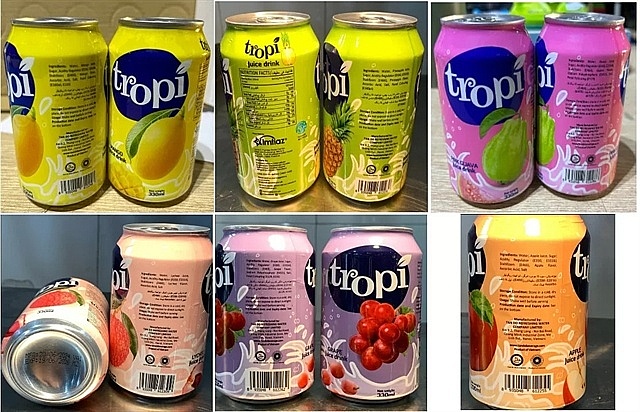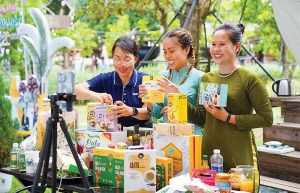Private producers see potential to export processed agricultural products to Pakistan
 |
IMTIAZ, Pakistan’s largest supermarket chain, imported its first batch of Vietnamese fruit juices, including mango, pineapple, lychee, grape, apple, and guava, in early September. A Vietnamese company outsources these juices.
“Being distributed through IMTIAZ supermarkets is a source of pride for any product, guaranteeing access to a vast consumer market of over 240 million people,” said Pham Anh Tuan, Vietnamese Ambassador to Pakistan and Afghanistan.
Founded in 1955, IMTIAZ is Pakistan’s pioneering supermarket chain and the largest retailer in the country, with 27 stores across 12 major cities, including Karachi, Lahore, Islamabad, Peshawar, and Quetta.
“Exporting fruit juice to Pakistan is a significant achievement, contributing to the development of Vietnam’s export structure by focusing on high-value-added processed products. It also promotes the agro-processing industry and creates new market opportunities for agricultural products, helping avoid the ‘bumper harvest but low price’ scenario,” said Tuan.
In early September, a delegation of 12 agricultural firms, including Nutifood Nutrition Food JSC, met with Pakistani authorities to explore opportunities for increasing exports of fruit juices and processed fruits to the country.
“We asked the Pakistani representatives to sample Vietnamese coffee and introduced them to our coffee varieties. They were surprised by the diversity and quality of our coffee. During my visits to local supermarkets, I noticed that the available instant coffee brands were of significantly lower quality than Vietnamese coffee,” Truong Hung, vice chairman of the Board of Directors at Nutifood.
Hung said that current promotions and communication efforts to showcase processed agricultural products overseas remain ineffective. There are many promising export markets enterprises have yet to explore. Attending fairs and exhibitions to seek partners and buyers, alongside trade promotion programmes organised by the authorities, is essential.
“Vietnam’s export potential to Pakistan remains substantial, as Pakistan’s processing industry is relatively underdeveloped, and the country has a high demand for various Vietnamese exports, from traditional agricultural products like tea, pepper, and cashews, to basa fish fillets. Agricultural manufacturers in Pakistan often request outsourcing production from our companies,” said Hung.
“Moreover, Pakistan is an accessible market with fewer stringent requirements for quality, technical standards, animal and plant quarantine, food safety, environmental protection, traceability, and labour practices,” he added.
In the first seven months of 2024, Vietnamese exports to Pakistan reached $269 million, an increase of 25.2 per cent on-year.
 | E-commerce platforms help to spread agricultural value E-commerce is opening up a dynamic global playing field and bringing more opportunities for Vietnamese agricultural products. Nguyen Minh Tien, director of the Ministry of Agriculture and Rural Development’s Trade Promotion Centre for Agriculture, explained more to VIR’s Tra My. |
 | Agricultural produce seeks to conquer e-commerce market E-commerce platforms are not only potential consumption channels but also create opportunities for fair competition for agricultural businesses to achieve higher export goals. |
 | Momentum building for agricultural enterprises Numerous new ventures in agriculture, and the attention of domestic and foreign investors, may enable the sector to fully exploit Vietnam’s specific advantages. |
 | Halal markets offer export opportunities for Vietnamese produce The global market currently has high demand for Halal products, especially agricultural products, offering an opportunity for Vietnam to tap into this promising segment. |
 | Leveraging technology to boost Vietnamese agricultural prosperity For many years, Nestlé has transformed Vietnam’s agriculture by pioneering sustainable farming and fostering robust rural communities through through the adoption of science and technological innovation. Le Thi Hoai Thuong, Nestlé Vietnam’s senior corporate affairs manager, talked to VIR’s Mai Anh about the company’s trajectory and what they have done to advance Vietnamese regenerative agriculture. |
What the stars mean:
★ Poor ★ ★ Promising ★★★ Good ★★★★ Very good ★★★★★ Exceptional
Related Contents
Latest News
More News
- Masan Consumer names new deputy CEO to drive foods and beverages growth (February 23, 2026 | 20:52)
- Myriad risks ahead, but ones Vietnam can confront (February 20, 2026 | 15:02)
- Vietnam making the leap into AI and semiconductors (February 20, 2026 | 09:37)
- Funding must be activated for semiconductor success (February 20, 2026 | 09:20)
- Resilience as new benchmark for smarter infrastructure (February 19, 2026 | 20:35)
- A golden time to shine within ASEAN (February 19, 2026 | 20:22)
- Vietnam’s pivotal year for advancing sustainability (February 19, 2026 | 08:44)
- Strengthening the core role of industry and trade (February 19, 2026 | 08:35)
- Future orientations for healthcare improvements (February 19, 2026 | 08:29)
- Infrastructure orientations suitable for a new chapter (February 19, 2026 | 08:15)

 Tag:
Tag:



















 Mobile Version
Mobile Version